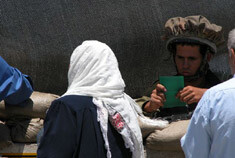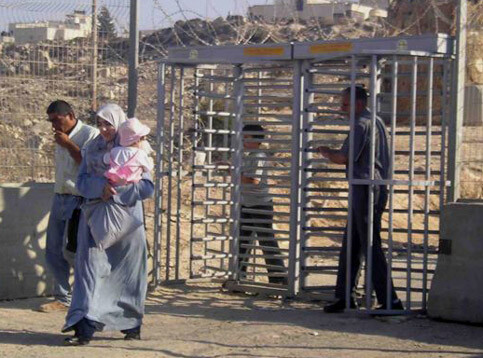The Electronic Intifada 1 February 2005
[PREVIOUS]

A passbook in Palestine. (Markus Cuel)

A passbook in South Africa. (UN Photo)
In this second article of a two-part series, Adri Nieuwhof, Bangani Ngeleza and Jeff Handmaker revisit key factors that built trust amongst both parties to the conflict in apartheid South Africa, without eroding key principles of the liberation movement, and reflect upon these experiences in the context of the Israeli-Palestinian conflict.
True commitment to peace?
History has not given the Palestinian people much reason to trust the intentions of the government of Israel. As countless articles, including those featured in The Electronic Intifada have illustrated, Israeli policies towards Palestinians living in Israel and the occupied Palestinian territories have had a huge and negative impact on their day-to-day lives, further weakening the prospects for peace.
While Ariel Sharon has repeatedly claimed to be driven by a commitment to peace, his actions have so far belied his words, particularly concerning its military occupation of Palestinian territories. Israel’s government has avoided, rather than confronted, objections raised by the settler movement to Sharon’s ‘plan for Gaza disengagement’. The further result is general avoidance of a critical discussion on what must eventually take place for any hope of peace to exist - a total withdrawal from all occupied Palestinian territories.
Build trust and show good will first
If Sharon is truly serious about peace, he must demonstrate that it is correct not only to withdraw from Gaza, but that a full withdrawal from all occupied territories, including the West Bank and Golan Heights is also necessary. Sharon should be encouraged to take bold steps as former South African president F W de Klerk did. This was despite facing widespread objection from white South Africans concerning his intentions to negotiate with the African National Congress (ANC), who knew that such talks would most likely lead to black majority rule, which of course they did.

Palestinians have to go through an iron gate at Kalandia checkpoint to enter Ramallah. (Markus Cuel)
Sharon’s decision to accept full withdrawal would form the groundwork, and possibly be a decisive factor in the success of peace talks. If Sharon is serious about peace, he must make this clear not only to the Palestinians but also to his constituency and all citizens of Israel. Sharon knows that a vast majority of the Israeli population have expressed support for unilateral measures, such as the withdrawal from Gaza, in opinion polls.
Involve all parties
Currently, Palestinian parties operate under the leadership of the Palestinian Authority (PA) headed by Mahmoud Abbas and the Israeli parties under the leadership of the Israeli government headed by Ariel Sharon. As in South Africa, peace negotiations demand involvement of all parties to the conflict. Many groups are dismissed by the government despite them having legitimacy within their own constituencies. As such, all groups, including Hamas and the settler movement, should be represented at the negotiating table in order to ensure that any talks have legitimacy and that peace will last. In South Africa, even the heavily armed, overtly fascist and racist Afrikaner Weerstand Beweging (AWB) took part in talks about transition, albeit reluctantly, and even when they threatened and exercised violence, peace talks were still allowed to continue.
In South Africa, an agenda that formed the basis for negotiations was agreed to by both leading parties (being the ANC and Nationalist government) prior to the commencement of negotiations, including a clear timetable for completion of the negotiations. This ensured that talks did not drag on. The talks paved the way to a commitment by all armed groups to cease violence, a release of political prisoners and the return of South African refugees (exiles), in collaboration with the United Nations High Commissioner for Refugees (UNHCR).
If equipped with a clear agenda of its own, one of the outcomes of negotiations in the Israel/Palestine conflict could include a timetable for key aspirations of both parties, including the disarmament of groups including Hamas and the settler movement, as well as Israeli withdrawal from occupied territories, respect for the fundamental rights of both Israelis and Palestinians, addressing the final problems to do with the wall, the release of political prisoners and a firm recognition of refugees’ right of return.
Process for negotiating peace
Principles that inform a peace process are agreed upon upfront, before actual negotiations begin. Crucially, these include mechanisms to break a deadlock and a commitment to see the process through.
A way of ensuring that both parties adhere to agreed principles needs to be found. Here the international community may play a role, making clear that while peace talks remain in the hands of Israelis and Palestinians, the violation of agreed principles will invite censure.
An outside mediator may help, however they should be thoroughly briefed about what each party considers to be the ‘bottom lines’, such as the issues of East Jerusalem being the capital of Palestine, the right of return of refugees and the security of Israel. There should also be space for compromise on issues that do not undermine the fundamental principles informing the struggle.
At the outset, difficult details concerning the process and substance of a possible agreement must be established, including the setting up of negotiation teams from both sides. To ensure legitimacy, it would be advisable to bring the ‘principals’, Abbas and Sharon, together only when it is clear that a breakthrough is possible. However, they should be consulted every step of the way.
Keep the spirit for change alive
Top-down and bottom-up mechanisms need to be incorporated into the peace process. Palestinians should not allow the negotiations process to dampen the people’s fighting spirit on the ground. On the other hand, Sharon and Abbas need to keep Israelis and Palestinians convinced about the correctness of seeking peace. To this end, negotiations should be accompanied by a fair amount of publicity, including well organised rallies that are aimed at keeping people informed of developments at the negotiating table and keeping the spirit of the struggle going, reminding all parties that negotiations represent another terrain for struggle, and not capitulation. Such rallies could also be used to spread the message of reconciliation, preparing the ground on all sides for the smooth implementation of a peace accord.
Genuine help from outside needed
The ‘Quartet’ has not performed well and its Road Map has led nowhere. The time has come for countries truly committed to peace in the Middle East to step forward. The United States has blindly protected Israel and lost the trust of the Palestinian people. Russia’s role in the Quartet has been a largely symbolic one. The other remaining members of the Quartet, the European Union (EU) and United Nations (UN) both offer potentially significant roles in helping to mediate the conflict.
EU or UN as mediator?
The European Union has generally pursued a strategy of appealing to all sides, favouring dialogue between itself and the parties over insisting and acting on conditions, offering little incentive for compliance or disincentive for non-compliance. However, as Israel’s chief trading partner and principal funder of the Palestinian authority, its central role is indisputable. Further, as a multilateral body, it has the capacity to issue sanctions, although it has failed to use these means at its disposal.1 While the EU’s efforts to induce Israel to comply with human rights obligations in the context of the EU-Israel Association Agreement have so far met with little success, organisations such as Christian Aid have recently argued that given US efforts to “stall the process…the EU must now assume an active political role as well as take humanitarian action.”2 However, strong leadership from amongst the EU’s member states is necessary before any progress will be made in this regard.
As the only universally representative body, with a long record of promoting peace in many troubled parts of the world, the UN has the capacity and legitimacy to operate as an independent mediator. It should take guidance from and act upon the August 2004 advisory opinion of the ICJ, which calls for collective action on the part of the international community. The UN may draw legitimacy from its experience of steering efforts to decolonise nations and dismantle apartheid in South Africa. However, as the dispute over Iraq has illustrated, the heavy dependence of the UN on the political will of the US, together with its influence as one of the UN’s chief sources of funding, have rendered it vulnerable to compromise and even manipulation.
South Africa as advisor?
South Africa has experience with effecting a successful change to democracy and could play a valuable role as advisor to the facilitators of the peace process. Its former government was long a supporter and trading partner of Israel and its current government has openly acknowledged the legitimacy of the Palestinian struggle.
Steps for a successful mediation
For a successful mediation in the peace process it is necessary, firstly, that a clear set of principles3 is in force for the parties involved. Secondly, respect for dignity and equality amongst all of the parties to the conflict is essential. Thirdly, the relative imbalance in power and access to information amongst the participants must be urgently addressed before genuine attempts at problem solving may be made. Finally, accountability between the parties and their constituencies can and should be encouraged, backed up by the international community issuing associated incentives (donor assistance and political support) and disincentives (reductions in donor assistance and sanctions).
Time is running out. The international community must not allow a culture of impunity to continue. In particular, the UN, the EU and possibly also South Africa should accelerate initiatives towards peace in the Middle East.
Adri Nieuwhof and Jeff Handmaker are human rights advocates based in the Netherlands. Bangani Ngeleza is a consultant based in South Africa.
Endnotes
Related Links
[PREVIOUS]





